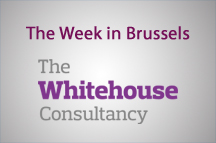 Last week saw not only the end of summer, but the third month anniversary of the UK voting to leave the EU. And, inevitably, Brexit continues to dominate the headlines at home and abroad.
Last week saw not only the end of summer, but the third month anniversary of the UK voting to leave the EU. And, inevitably, Brexit continues to dominate the headlines at home and abroad.
In the last three months, we’ve come to understand that “Brexit is Brexit,” but precious little else. Foreign Secretary Boris Johnson suggested this week that Article 50 could be triggered early(ish) in the New Year, but no such confirmation has been forthcoming from Downing Street. With the Conservatives convening in Birmingham for their annual conference, all eyes will be on Theresa May and whether we’ll get a little more than “Brexit is Brexit.” One thing’s for sure. The process will be difficult (according to Italian PM Matteo Renzi), lengthy, and costly – with suggestions Britain could spend some £65 million bringing in the specialist support the government needs for negotiations.
Let’s not talk about Brexit
 A fortnight ago, EU Commission President Jean-Claude Juncker was insistent Brexit could not and must not dominate the EU agenda. And there have certainly been efforts in that past week to realise that ambition.
A fortnight ago, EU Commission President Jean-Claude Juncker was insistent Brexit could not and must not dominate the EU agenda. And there have certainly been efforts in that past week to realise that ambition.
On Wednesday, the Commission proposed a mandatory Transparency Register covering all three EU institutions, in an effort to “win back the trust of our citizens,” in the words of First Vice-President of the EU Commission Frans Timmermans. The Commission has called on both the Parliament and Council to adopt the register, which is intended to ensure consistency across the institutions as to their levels of transparency when it comes to lobbying. Under the proposals, individuals or groups that fail to comply with an accompanying code of conduct could be removed from the register and have their ability to communicate with the institutions limited or halted entirely.
So, a victory for transparency.
Outside of Brussels, but with every bit as much relevance to the EU, an informal meeting of defence ministers took place in Bratislava. Germany and France used the get together to advocate for the creation of a European military headquarters.
The suggestion was given short shrift by UK defence secretary Sir Michael Fallon, who argued the plan would undermine NATO with consequences for collective security. As long as it is in the EU (oops, Brexit again) the UK is determined to oppose the plans. But in a sign Britain isn’t out the door yet, it will have its hand on the tiller of Europe’s security with Sir Julian King serving as Commissioner for security and counter-terrorism.
Back to Brexit
Of course, Brexit was never far from the headlines. Former French President Nicolas Sarkozy offered the UK a second bite at the proverbial cherry, pledging to work on a new EU treaty if elected to the French presidency for a second time next year.
But for all the talk of Brexit, what it means, the pros and cons, and whether it will result in economic prosperity or slow down, you couldn’t beat the comments this week of German Commissioner Gunther Oettinger. In an early contender for the award for most succinct explanation of Brexit, Oettinger said, “I’m sorry, but we have to accept it, that’s life and s*** happens.”














